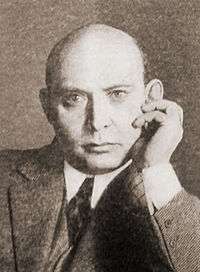Manya Gordon
Manya Gordon Strunsky (1882-1945), best known as Manya Gordon, was a Ukrainian-born Jewish-American historian and political activist. Gordon is best remembered as a pioneering social historian of Soviet Russia through her seminal 1941 book, Workers Before and After Lenin.
Biography
Early years
Manya Gordon was born in about 1882 in the city of Kiev, Ukraine, then part of the Russian Empire. A family of ethnic Jews, the Gordons emigrated to the United States from the increasingly anti-semitic Tsarist regime in 1896, settling in New York City.[1] Gordon was educated at home but later received academic training in history and drama through courses completed at Columbia University.[1]
In New York Gordon was active in the American section of the Russian Socialist Revolutionary Party (PSR), an organization dedicated to the forcible overthrow of Tsarist autocracy in Russia.[1] She was also involved in the assisting newly-arrived Jewish emigrés from Russia and Eastern Europe, aiding them in finding jobs and housing in America.[1]
Scholarship

After the Russian Revolution, Gordon worked as a freelance journalist specializing in the topic, contributing articles to Harper's magazine, the North American Review, and other publications.[1] Her entry into the journalistic orbit brought her into contact with Simeon Strunsky, an essayist and member of the New York Times editorial board, whom she later married,[1] legally taking her husband's surname while continuing to use her maiden name as a pen name. The couple would have two children.[1]
With the development of the Russian Revolution an ongoing source of fascination in the United States throughout the decade of the 1930s, Strunsky began work on a monograph dealing with the evolution of treatment of the working class before and after the Bolshevik regime. This was published in 1941 as Workers Before and After Lenin by prominent New York publisher E.P. Dutton and Company.[2] In the book Gordon's "bottom-up" attention to the lives of common people rather than the intricacies of high politics anticipated the turn to social history during the 1960s and beyond in the field of Soviet Studies.
In her book Gordon made use of Soviet sources in arguing that under the Communist regime living standards of the working class had deteriorated to the point that the purchasing power of wages in the late 1930s stood at only about 75% of the food value purchasable by Russian workers in the years immediately preceding World War I.[3] Nominal wage gains had been more than offset by price increases of staple goods, while consumer goods were shoddy and in poor supply, Gordon argued.[3]
A second book, How to Tell Progress from Reaction: Roads to Industrial Democracy, was published by the same publisher in 1944.[4]
Later years
Throughout the 1930s Gordon did solidarity work with imprisoned Russian social democrats in the Soviet Union, serving as Secretary of the New York Society for Socialist Party Prisoners and Exiles in Soviet Russia.[5]
In later years Strunsky worked as a literary critic for the New York magazine Saturday Review of Literature.[1]
Death and legacy
Manya Gordon Strunsky died of a heart attack on December 27, 1945 in New Canaan, Connecticut.[6] She was 63 years old at the time of her death.[6]
Footnotes
- 1 2 3 4 5 6 7 8 Jerome S. Legge, Jr., "Manya Gordon Strunsky (c. 1882-1945)," in Paula E. Hyman and Deborah Dash Moore, Jewish Women in America: An Historical Encyclopedia. In Two Volumes. New York: Routledge, 1998; vol. 2, pg. 1354.
- ↑ Manya Gordon, Workers Before and After Lenin. New York: E.P. Dutton & Co., 1941.
- 1 2 Bertram W. Maxwell, "Review of Workers Before and After Lenin by Manya Gordon," American Political Science Review, vol. 35, no. 3 (June 1941), pp. 570-571.
- ↑ Manya Gordon, How to Tell Progress from Reaction: Roads to Industrial Democracy. New York: E.P. Dutton & Co., 1944.
- ↑ "Socialists Persecuted," Middletown [NY] Times-Herald, vol. 84, no. 282 (Dec. 2, 1935), pg. 5.
- 1 2 "Mrs. M.G. Strunsky," Ottawa Evening Journal, vol. 61, no. 17 (Dec. 29, 1945), pg. 20.
Works
- "Democratic Forces in Russia," North American Review, vol. 215 (Feb. 1, 1922), pp. 155–166.
- "Organized Labor under the Soviets," Foreign Affairs, vol. 16, no. 3 (April 1938), pp. 537–541. In JSTOR
- Workers Before and After Lenin. New York: E.P. Dutton & Co., 1941.
- How to Tell Progress from Reaction: Roads to Industrial Democracy. New York: E.P. Dutton & Co., 1944.